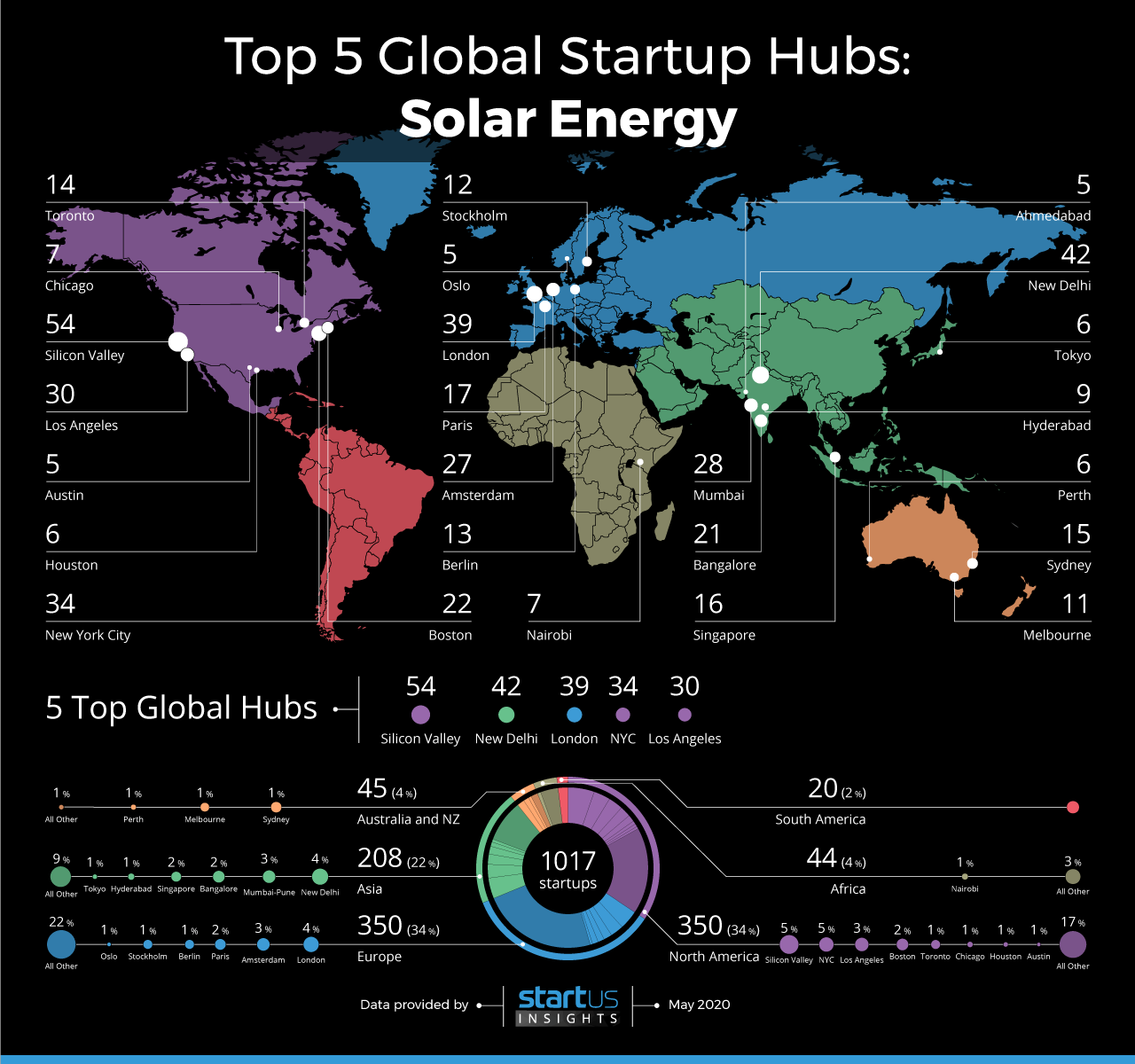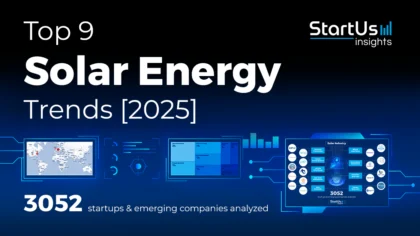The topic of discussion around solar energy is constantly evolving. Breakthrough innovations in solar technology are sometimes quickly replaced by improved solutions, making it difficult to forecast the future of the solar industry. Energy storage and energy efficiency form the basis of almost all innovations in solar. Combined with government policies aimed at mitigating climate change, startups and emerging companies develop a variety of solar energy solutions ranging from highly efficient panels and easier maintenance of solar infrastructure to improving access to clean energy sources.
Top 5 Global Startup Hubs: Solar Energy
Using our StartUs Insights Platform covering more than 1.116.000 startups and emerging companies, we analyzed the geographic distribution of global startup activity in solar energy. We identified 47 regional hubs* that observe high activity in developing technology-driven solutions across the industry like reducing costs for photovoltaics, expanding solar energy storage, and employing advanced analytics to optimize solar energy output, to name a few.
Within these hubs, we analyzed a sample of 1.017 startups employing technology-driven solutions to innovate in the industry. Silicon Valley, New Delhi, London, New York City, and Los Angeles are home to 200 startups and emerging companies* and account for 20% of global activity in solar energy. Let us have a look at some of the innovative solutions from these top 5 hubs.
Based on our analysis of a sample of 1.017 startups, we observe that North America and Europe together account for almost 70% of global activity. This push towards solar is driven by innovations aiming to mitigate climate change along with government policy to gradually reliance on fossil fuels.
Asian hubs already observe nearly one-fourth of global solar activity, and together with African hubs, are driven by the need to provide uninterrupted electricity supply to their major cities while also expanding access to energy for several remote and poorly connected regions.
1. Silicon Valley: 54 Startups
Almost 20% of California’s electricity is produced from solar energy. Over the years, the cost of solar and PV systems has significantly reduced, enabling higher rates of adoption in the state. Silicon Valley companies and startups are designing new partnership agreements to install large-scale solar facilities in the region. Numerous innovations from digital technologies for tracking energy use and optimizing grids to solutions for reducing the component costs of energy generation sites make Silicon Valley one of the top solar energy hubs in the world.
Based out of San Mateo, Optivolt Labs is a startup developing autonomous solar charging solutions. They offer a fully customizable and scalable solar technology stack with the aim of enabling self-charging machines. From drones and robots to shared mobility, the startup designs and produces modular solar charging prototypes for subassemblies and also offers licensed products to original equipment manufacturers (OEMs).
2. New Delhi: 42 Startups
India targets generating 175 GW of energy from renewable sources by 2022. Solar energy is the largest share of these new renewable energy projects. With the goal of achieving 40% of its energy from renewables, the government has increased the capacity for establishing large-scale solar farms around the country. Companies, mature and young, develop solutions to increase adoption rates, improve energy efficiency, and lower maintenance costs for solar energy.
Noida-based startup Skilancer Solar designs and develops autonomous water-free solar module cleaning systems. The self-powered robotic solution incorporates a simple design that solves challenges regarding load-bearing for solar panels by running on the frame structure as well as misalignment issues that are common for robotic solar panel cleaning solutions. The centrally operated systems provide real-time statistics to track and control the robot.
3. London: 39 Startups
The UK generates more renewable energy from wind and biofuels than from solar. This is understandable as solar energy faces intermittence issues in many parts of the region. However, for London to achieve its target of becoming a zero-carbon city, smarter solar energy solutions are required. This drives innovations in solar panel efficiency, dynamic solar heating, and more capable energy storage solutions. The city’s Solar Together London program subsidies group-buying by residential communities who agree to install rooftop solar panels.
Cambridge-based startup Lambda Energy builds spectral converters for boosting the power output from solar panels. Usually, photovoltaic (PV) panels are best at converting the red light from the sun’s rays into energy, while not capturing much of the blue or green light. Lambda’s active coating for the PV glass component allows the panel to convert the blue and green light into red, thus improving the power output from the panel. The coating protects the panel from harmful solar radiation and allows for installations in desserts as well.
4. New York City: 34 Startups
New York State actively promotes the wider adoption of solar energy. A series of tax incentives, net-metering options, and a strong push for rooftop solar drives innovation in this solar energy hub. New York City startups and emerging companies are looking to exploit the vast acres of rooftop space available in the city to install solar energy. With the country’s most expensive electricity bill for consumers, the city is also developing policies that subsidize and push for higher adoption of solar energy. Compared to other regions in the country with a higher solar power output, New York City faces intermittence issues and requires community collaboration to reach its target of 6 GW of solar energy by 2023.
Gazelle Solar is a New York City startup developing a portable small scale solar tracker. Solar trackers improve the efficiency of PV panels by shifting its position according to the movement of the sun. With three size options that accommodate up to 240 watts of energy, this solution is suitable during emergency situations and for powering regions with intermittent electricity supply. Their working prototype solar tracker is low-cost and employs new patent-pending technology in comparison to large solar arrays.
5. Los Angeles: 30 Startups
Estimates suggest that almost one-third of the US solar energy workforce is based out of California. State laws target 100% renewables-powered electricity supply by 2045. Currently, Los Angeles roughly gets 30% of its electricity from clean energy, including solar. Moreover, federal incentives for residential and business establishments provide several opportunities for developing solar. Startups and emerging companies, as well as big industry players, work on solutions that enable wider adoption of solar by developing technologies to build, maintain, and monitor solar energy installations.
Hailing from Huntington Beach near Los Angeles, Arctica Solar is a startup that produces solar air heaters for cold climates. Their technology combines an optimized absorber material with a patent-pending convective heat transfer, or air handling system, as well as a low-weight design. With the intention of replacing fossil fuels to heat spaces, this solution is available as a fully factory-assembled unit, or as a DIY kit.
What’s Next?
Government and emerging companies alike look to develop solar energy in order to tackle poor electricity supply as well as the high cost of implementation. Startups have to constantly achieve a balance between the cost and performance of solar energy sources. One of the key factors that prevent the larger adoption of solar technologies is the number of fossil fuels currently used to manufacture these technologies. At the same time, higher adoption of solar will play a major role in pushing these costs down.
*We define a hub as the regional geographic center of activity for this topic. It covers the center point with a radius of 100km. We define startups as those founded after 2015.










